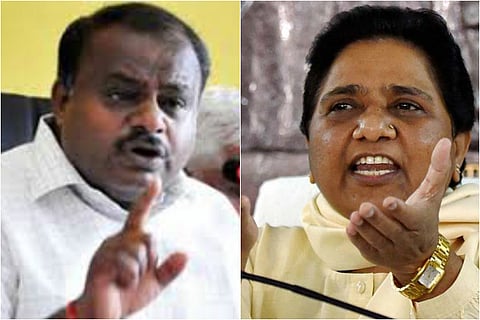

On Thursday, the Janata Dal (Secular) and Bahujan Samaj Party formed an alliance to contest the upcoming Assembly polls in Karnataka, which will be held on or before May.
With Mayawati’s dwindling fortunes in Uttar Pradesh, party insiders say that the BSP now wants to strengthen its base in Karnataka and an alliance with the JD(S) is just the beginning.
However, JD(S) sources say that the alliance is not going to make much of a difference, but will ensure that the JD(S) is able to win a handful of seats in the polls.
The BSP contested Assembly polls in Karnataka for the first time in 1994 and the party managed to win only one seat in Bidar. The then BSP MLA Syed Zulfikar Hasmi later quit the party.
Although the party has contested polls in the state over the years, it was only in 2004 that the BSP managed to win a few seats in Karnataka.
According to election commission data, in the 2004 Assembly elections, the party won 1.74% votes out of the 102 seats it contested for. In the 2008 Assembly elections, the BSP had contested in 217 constituencies and managed to win 2.7% seats. In the 2013 polls, the BSP did not win a single seat.
“Considering the fact that the BSP has absolutely no power in Karnataka, the major reason why we aligned with the party is just to shake up Siddaramaiah’s Ahinda (Kannada acronym for Dalit, Adivasi and minority vote banks),” a JD(S) leader says.
Insiders also say that a section of leaders who were rallying for an alliance with the Bharatiya Janata Party are unhappy with this development.
“There are the youth wing leaders in the JD(S) who do not want this alliance as it may hamper their agenda. Some leaders want an alliance with BJP once the voting is done and they are unhappy about the tie-up with the BSP. This is because the Dalit leaders in JD(S) fear that the BSP candidates will now become the voice for Dalits in the alliance and they will lose power. This dissent will not last for a long time as everyone knows that the party head, Deve Gowda, is only interested in ensuring that the vote banks are disturbed,” the JD(S) leader adds.
According to him, the tie-up will not hurt the JD(S)’s chances and it will not make a difference to the party if the BSP candidates don’t win.
“Only 14 BSP candidates will contest. The JD(S) clearly has nothing to lose here. If they win a few seats, it is beneficial. The most important thing is that Mayawati will bring in the money the JD(S) needs. The alliance is meant to only strengthen JD(S) leaders through tough campaigning and for that money is a necessity,” the JD(S) leader says.
Party insiders say that the alliance is a calculated move to disrupt the Congress’ strong vote base in the Hyderabad-Karnataka region.
“This is a region where minority votes are in abundance and the Congress has managed to retain this region for a long time. The BSP leaders, who have won in the past are mostly from the Muslim and Dalit communities. Besides, the growing disenchantment among Dalits with BJP and Congress will give us enough push to shake the minority vote bank,” the JD(S) source added.
Speaking to TNM, political analyst, Sandeep Shastri says that the BSP has never had a strong voter base in Karnataka since the time it contested the 1994 polls. Sandeep attributes this to the lack of a grassroots connection.
“The JD(S) and BSP alliance is one of convenience. Through this, the JD(S) wants to shed its image as a party for Vokkaligas and break into the Dalit and Muslim vote banks and the BSP can benefit from non-Dalit votes. But I doubt this alliance will make any difference because all the BSP candidates who have won a seat so far have done so because they have a strong local following in their respective constituencies. Their power does not extend to the entire state,”Sandeep adds.
He maintains that the BSP failed to become powerful in Karnataka because the Dalit and minority votebanks had already aligned themselves with the Congress before the BSP contested polls in the state.
“Karnataka’s Dalit politics are not the same as that in UP and Bihar. The Dalit movement began in Karnataka before it did in the north and the Congress had capitalised on Dalit votes before the BSP even opened its account in the state. Besides, the BSP did not have a strong face in Karnataka and a strong cadre, which could build a grassroots movement. This is one of the major reasons for its failure here,” Shastri says.
Speaking to TNM, a senior JD(S) leader says that the current alliance, will in no way affect the party in taking a call on tying up with either the Congress or BJP once the polls conclude.
"The BSP will essentially have no say in the alliance the JD(S) will form because it is highly unlikely that the candidates will win in all 14 constituencies they will contest. This means that even if the BSP wins a bare minimum of 3 or 4 seats, the JD(S) will still be able to decide whom to align with if the Assembly is hung. That's why the rumblings of dissent within the JD(S) about the new alliance will not last long," the leader added.